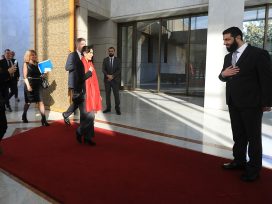Europeans are expecting change. If no direction for a new form of development is found, then Europe will be headed for stagnation, degradation and then collapse. All of this could happen in the blink of an eye.
We already know that Angela Merkel is once more at the helm in Germany and that, yet again, she will be the one calling the shots in the EU. We do not, however, know how this will impact Europe, since the recent elections have not yielded any new projects for the development of the EU – on the contrary, Germany’s presence in the eurozone has been called into question. The political party Alternative for Germany (AfD) highlighted cracks within Merkel’s own party, with some running along the fault lines of European policy, even though AfD received just under 5 per cent of votes and did not make it to the Bundestag. But Merkel’s former coalition partners – liberals – were ousted as well.
The Czech Republic is about to form a new government ahead of the European elections in May 2014. The slightly more pro-European social-democrats are favorites to form the government but politics in the Czech Republic has been surprisingly unpredictable since the successful, zealously populist campaign of Milos Zeman for the January 2013 presidential elections and a recent new start-up populist party, ANO 2011, becoming the country’s second most powerful force in October 2013.
Looking ahead, in September next year Scotland will hold a referendum on independence from the United Kingdom. This may turn out to be a vote to stay in Europe, if the UK decides to leave the EU. Should this happen, it will be a bitter pill for Europe to swallow and set off a chain reaction whose outcome is impossible to determine. It is true that Prime Minister David Cameron seemed to come to his senses this January and put forward a genuinely interesting project for the reorganization of the EU’s principles. The question is, though, if anyone is going to listen to the secessionist who is walking away from the table.
A rhetorical mishmash
A rash of speeches on Europe – by Radoslaw Sikorski, José Barroso, Angela Merkel – have done nothing to change the fact that the debate is not moving forward; and neither are we. It is a discussion that has turned its back on its citizens.
In this context, Cameron’s speech on British EU membership in January was the most pertinent. This was probably due to the fact that it referred to the daily experiences of citizens more than to the integration of administrative systems. These experiences are of disappointment and an uncertain future.
In speaking of competitiveness, Cameron considers it to be absurd that consumers in a single market are not able to make purchases in online shops throughout the EU as a whole. He added an anti-bureaucratic sentiment into the mix, calling for flexibility over unbending regulations. He referred to the need for decisions to be taken as closely to citizens as is possible, declaring that power should not flow exclusively from member states to the European Commission but also in the opposite direction – in other words, there is a need to stop the rot concerning the observance of the principle of subsidiarity in the EU. Furthermore, he appealed for the re-empowerment of national parliaments and for fairness, that is, for those commitments to a common market to be fulfilled which are in Britain’s interests, regardless of the ongoing integration of the EU, in which Britain is not involved.
In a word, it is a political mishmash and an important lesson that shows how to influence European public opinion while calling its very existence into question. What conclusions can Poland and Europe draw from this? Who should we listen to?
The direction that further integration takes is laid out by a parliament that de facto creates the legal system in the countries of the EU. It is, however, the national parliaments and administrations that make the decisions defining the pace of the “ever closer union of nations”. And voters make their choices on the basis of their own difficult experiences, rather than an awareness of the gravity of the situation in which we find ourselves. The resentment growing in Europeans commands them to take back the power which the EU has taken from them. How then should it be returned? Tensions concerning immigrants also persist.
How, then, will Europeans vote if they are disappointed by the lack of a sense of social security and the lack of jobs and of proposed solutions?
They are going to vote for the most vocal critics of the EU. Soon there will doubtless be many MEPs in Brussels who are willing to blame the EU for absolutely everything. The European taxpayer will, furthermore, be funding their substantial paychecks to further incite euroscepticism. These MEPs will mainly represent the countries that have been in the EU the longest, where there is little competition in European elections. This is how parties such as Nigel Farage’s United Kingdom Independence Party (UKIP) have made such gains in political capital – from a marginal party, it has become the third political force in the UK, garnering 18 per cent in a poll from May 2013, outstripping the Liberal Democrats. France’s eurosceptic Front National led by Marine Le Pen is also becoming more powerful, as is Hungary’s Jobbik.
All of these parties speak in the straightforward language of populism and appeal to the emotions and to daily experiences. Who from the European establishment today can speak like this?
Let’s forget about the treaty
Why exactly should Europe not be even slightly populist, have a human face, be able to exploit hopes, expectations and values? How long will politicians continue to place national patriotism above European patriotism? They are not mutually exclusive. They are related.
That is why we need a foundation in the form of a constitution which would cover no more than a few sides of paper and which would put down in a readily comprehensible form the values we share – concise and for the people. Not a treaty for nations, but a constitution for citizens. It should clearly show the divisions between the competences of national and European government without the need for a fancy preamble or other baubles and it should put the freedom of citizens and civic communities front and centre. It should also be straightforward and easy to remember. Above all it should clearly express the hope that a future created by Europeans together will be better.
It is a risky idea but, without it, the risk of the EU falling apart may be too great. And all the political forces currently gaining in strength due to the economic crisis are headed towards this disintegration.
When it comes to Poland and the countries of central Europe, however, the tendency in elections for the European Parliament are the opposite. Each party sends its most intelligent representatives, leaving open seats in parliament for their inexperienced or even untalented colleagues.
However, news of spectacular action or speeches made by Polish MEPs in Strasbourg and Brussels does not make it back to the country. The potential of a European outlook in the national parliament, the ability to speak of Poland’s national interests in terms of the European interest, is being wasted and the current government may turn out to be the last to support further integration with such enthusiasm.
How can Poland sustain the European element while keeping a safe distance, as well as taking a good common sense line in elections with regard to strengthening our role in a Europe heading towards federalism?
One way would be to announce a constitutional initiative that would be the foundation for our future in the EU. Regardless of whether our candidates are successful in being placed in international positions, such an initiative – along with the support and acceptance of further EU partners – would move Poland nearer to the role it so craves in the group of the most important countries.
The constitutional project may well be utopian but it is utopias that have changed the world and given it a democratic character. It is worth fighting for, if only to be able to imagine that things can be better and that making them so is worth striving for.
A strong, positively understood populism, a patriotism for the future and the intelligible face of a community are built on populism and not on bureaucratic procedures. If Europe fails to convince itself of this then it will be possible to compare it to the Soviet Union or Austro-Hungary and all that will be left will be to wait for the inevitable.







